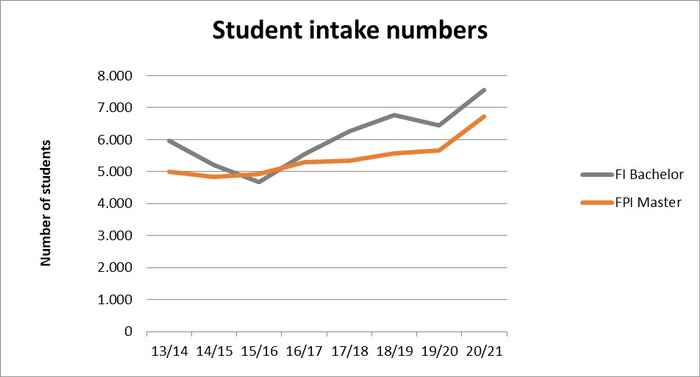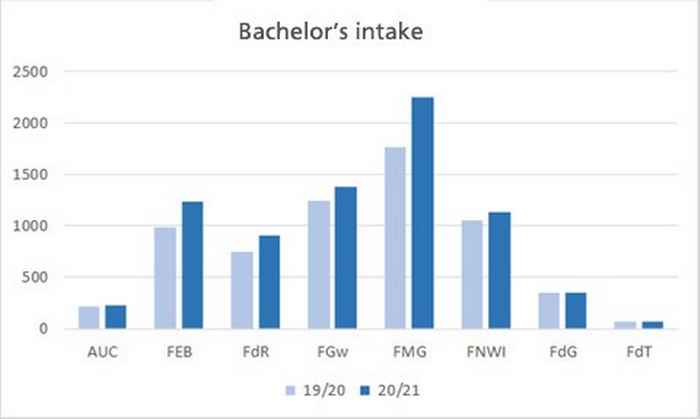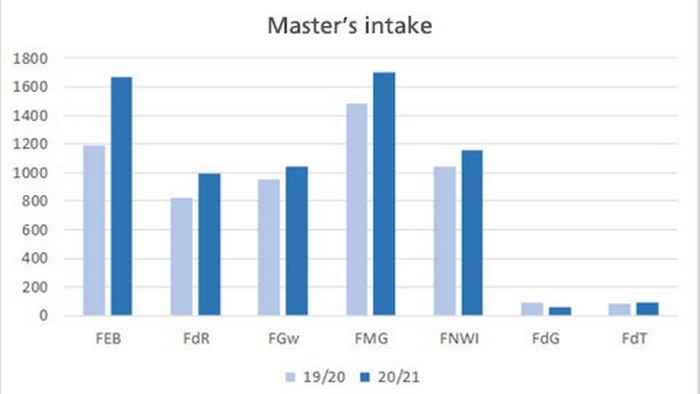Intake of Bachelor's and Master's students increases sharply
30 October 2020
These are the provisional figures as of 17 October 2020. The final figures will be available in February 2021. The picture we are seeing at the UvA is in line with that at other Dutch universities and the universities in neighbouring countries. The increase in the total number of students at the UvA is slightly more than the national average: 10% against 8%.
Bachelor’s intake
The number of first year students in Bachelor's programmes increased from 6,434 to 7,450, a difference of + 17%. The increase is greatest at the Faculty of Social and Behavioural Sciences (FMG), Faculty of Economics and Business (FEB) and Faculty of Law (FdR), + 27%, + 25% and + 20%, respectively. The Bachelor's intake at the Faculty of Humanities (FGw) increased by 11%, and at the Faculty of Science (FNWI) there are 8% more first years overall.
Of the new Bachelor's students, 5,110 come from the Netherlands and 2,430 are international. Last year there were 2,083 new international Bachelor's students, so this year’s number represents an increase of 17%. A majority of the international students come from within the European Union: 1,797. One striking feature is the increase in the number of students from Germany, from 294 to 426 (+ 45%). From outside the EU, the number of first years from Asia also increased sharply: from 263 (last year) to 327, an increase of 24%. The Bachelor's intake from the US and Canada, on the other hand, has declined, from 75 to 57 (-24%). The expectation at the start of the corona crisis - that the number of foreign students would drop sharply – has proved to be unfounded. At the FdR, the increase in the number of first years is solely due to an increase in the number of students from the Netherlands. At the FEB, an increase in both the number of Dutch and international students can be seen.
New Master’s students
The intake of Master’s students is up 19%: there are 6,716 new Master’s students this year compared to 5,662 in 2019. This number includes the transfer of students who have not yet completed their Bachelor's degree - due to the corona situation, the so-called 'hard cut' (meaning that students may only start their Master's after completing the Bachelor's) was foregone last academic year. Almost half of the 19% increase concerns students who have not yet completed their Bachelor's degree. The largest increase in the number of Master's students can be seen at the FEB: + 41%. The intakes at FdR, FMG, FNWI and FGw have seen increases of + 21%, + 15%, + 11% and + 9%, respectively.
The international intake in the Master's phase - excluding those transferring from Bachelor's degrees – is up 31%, from 1,121 (last year) to 1,472 (this year). A majority of the new Master's students come from the EU: 1,004. The largest increases in absolute terms can be seen in the numbers of new Master's students from China (from 123 to 200; + 63%), the United Kingdom (from 103 to 150; + 46%) and Greece (from 52 to 80; +54 %).
Possible explanations
It is difficult to say with certainty why this increase in the number of new Bachelor’s and Master’s students has occurred, but it is clear that the corona crisis has played a major role. For instance, fewer Dutch students have chosen to take a gap year (to travel, for example) before starting their university studies. The higher pass rates in VWO (university preparatory education in Dutch secondary schools) could also have played a part (due to the corona crisis, students did not have to take a central final exam last school year).
The increase in the numbers from Europe may be because students have preferred to stay closer to home with the corona situation being what it is; traveling within the EEA remains relatively easy compared to travelling outside it. Dutch students who were planning to study abroad may also have changed their plans due to corona. For international students, the possibility of being able to study remotely (online) in Amsterdam, without having to pay high housing costs, could also have played a role. But the reverse could also apply: at the time of the registration period, the fight against the coronavirus in the Netherlands and Europe as a whole was proceeding more successfully than in some other parts of the world, and education at physical locations was continuing (albeit on a smaller scale than usual). This may have prompted students from other countries to enrol at the UvA and to have the confidence that the Netherlands was a good destination for study in these times. The increase in the number of students from outside the EEA, especially from Asia, may also be due to the fact that these students currently find other countries, such as the US, less attractive or less accessible. Finally, Brexit may have played a role because it has become less attractive for students from the EU to study in the United Kingdom.
Total number of students
The total number of students enrolled at the UvA increased by 10% this academic year, from 35,511 to 39,051. The increase is largely attributable to a higher intake in the Bachelor's and Master's programmes. Another factor is that, due to the corona crisis, the UvA did not issue any negative binding study advice (BSA) to students in the final semester of last year. Instead, students were given a deferred BSA, which gives them the opportunity to obtain the required number of credits for the BSA in two academic years instead of one. As a result, there are relatively more second year students at the UvA than in previous years.


